人教版2023年中考英语一轮复习 第七课时 八年级上册(Unit 5~Unit 7)课件(共38张PPT)
文档属性
| 名称 | 人教版2023年中考英语一轮复习 第七课时 八年级上册(Unit 5~Unit 7)课件(共38张PPT) | 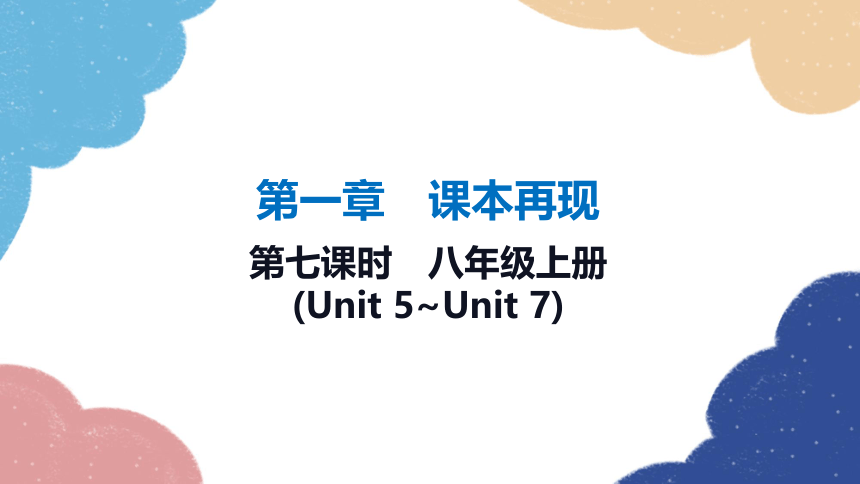 | |
| 格式 | pptx | ||
| 文件大小 | 597.6KB | ||
| 资源类型 | 教案 | ||
| 版本资源 | 人教新目标(Go for it)版 | ||
| 科目 | 英语 | ||
| 更新时间 | 2023-05-23 19:27:38 | ||
图片预览

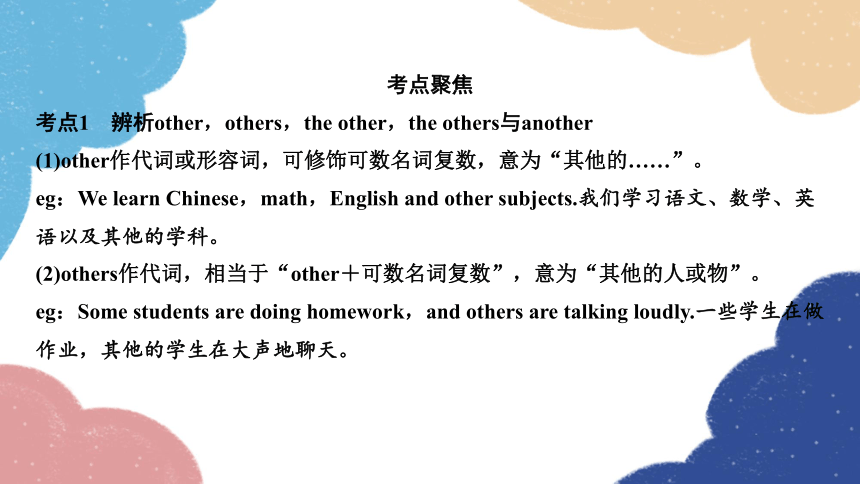
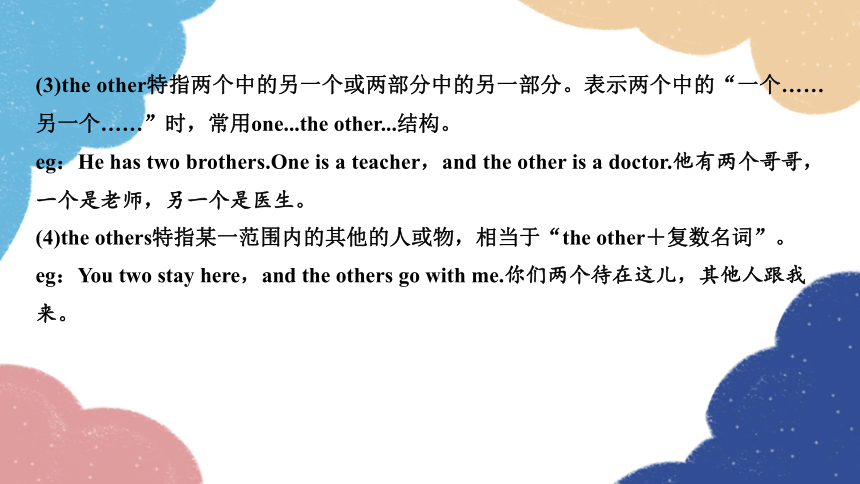
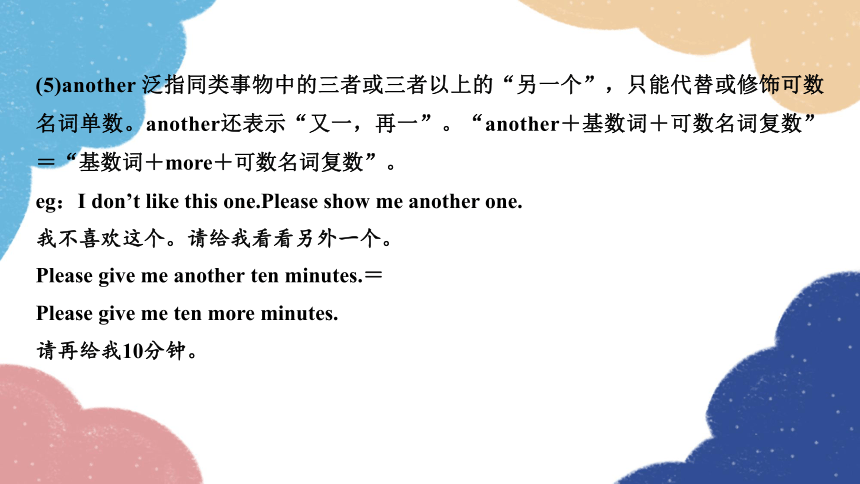
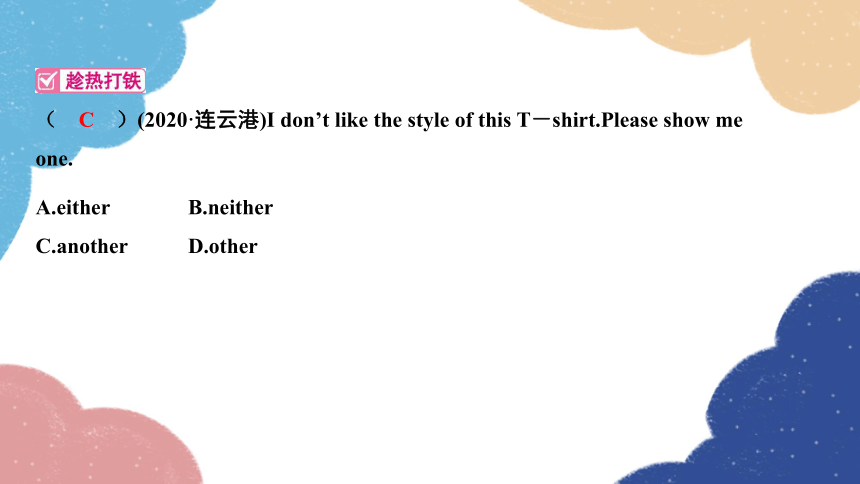
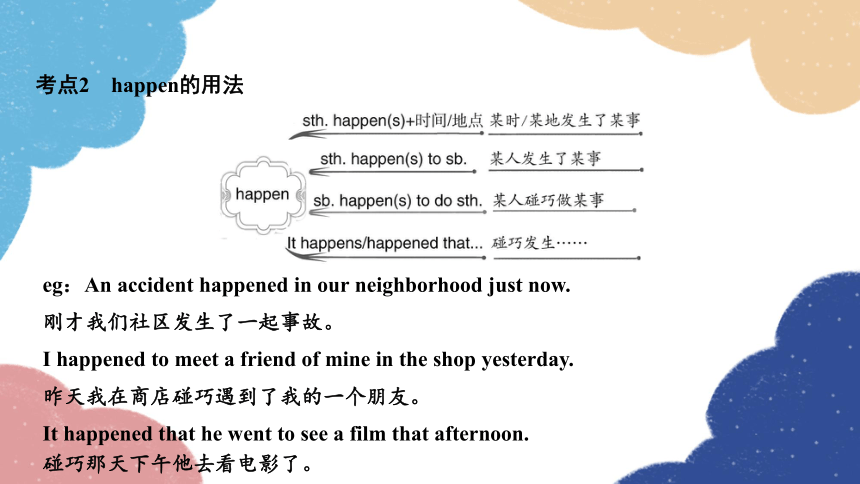
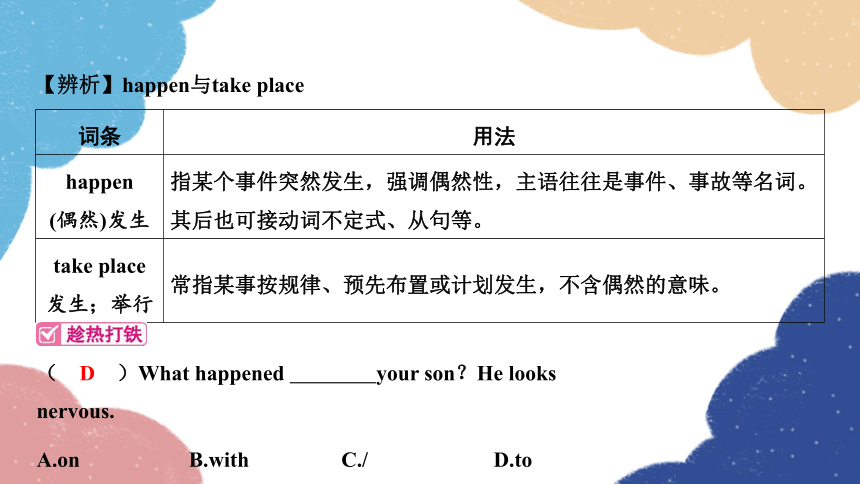
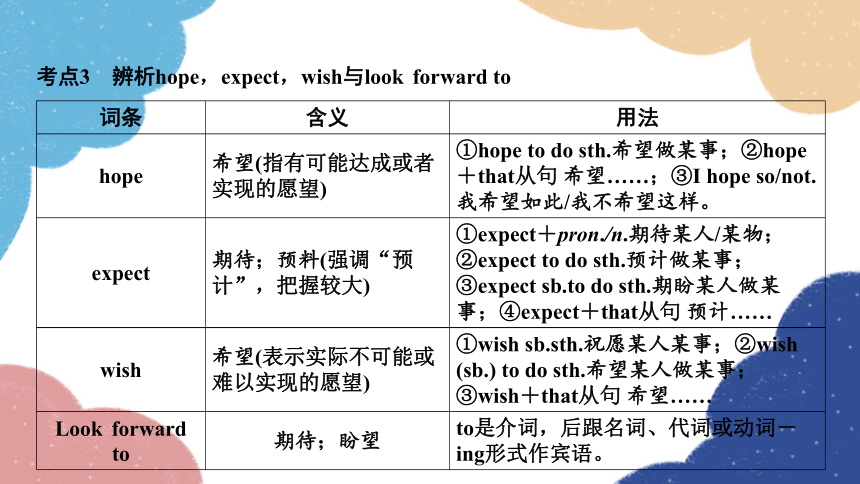
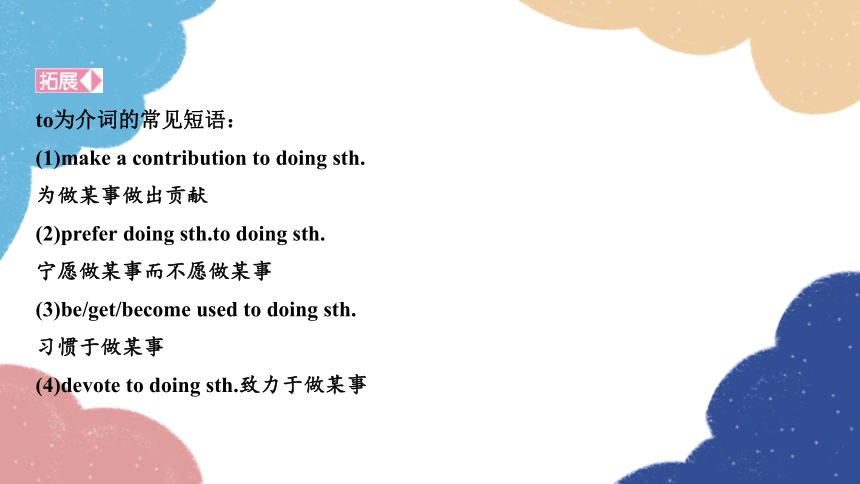
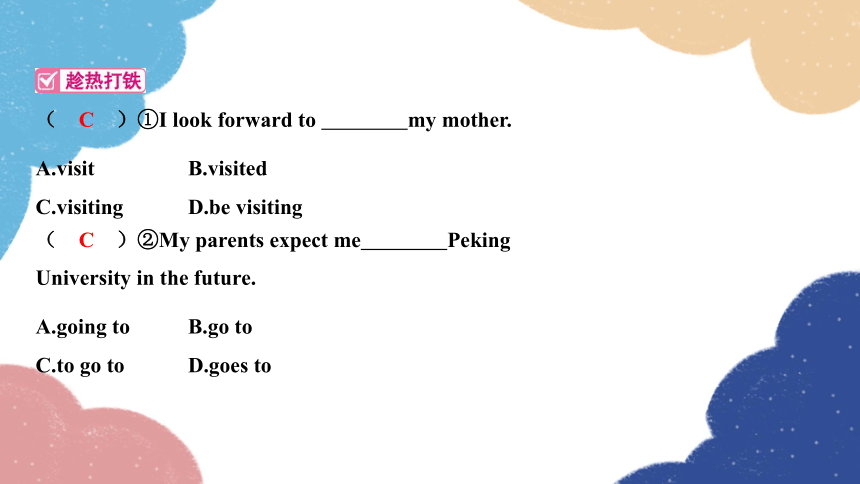
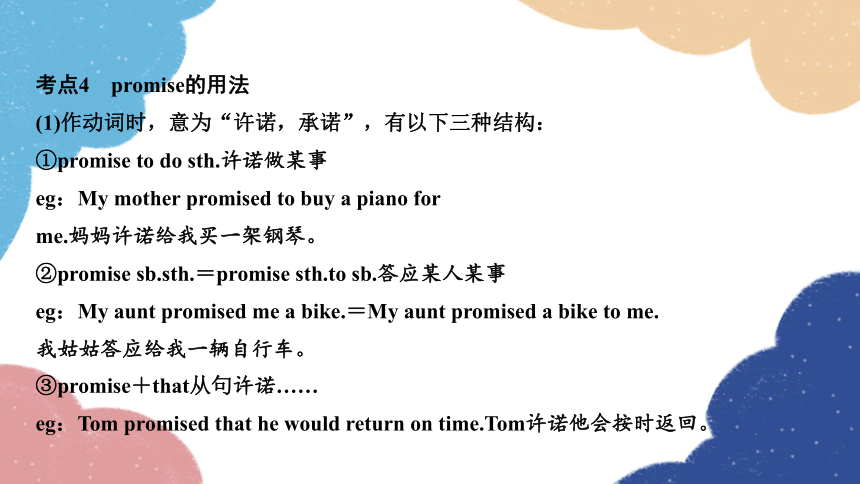
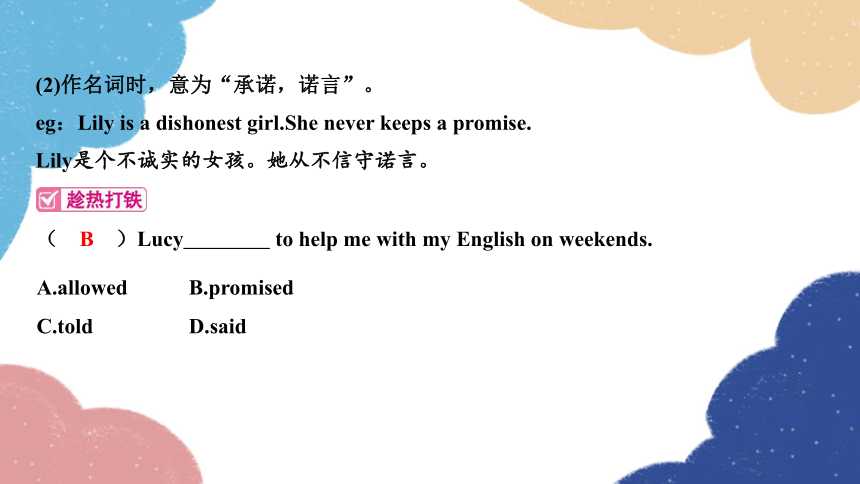
文档简介
(共38张PPT)
第七课时 八年级上册
(Unit 5~Unit 7)
第一章 课本再现
考点聚焦
考点1 辨析other,others,the other,the others与another
(1)other作代词或形容词,可修饰可数名词复数,意为“其他的……”。
eg:We learn Chinese,math,English and other subjects.我们学习语文、数学、英语以及其他的学科。
(2)others作代词,相当于“other+可数名词复数”,意为“其他的人或物”。
eg:Some students are doing homework,and others are talking loudly.一些学生在做作业,其他的学生在大声地聊天。
(3)the other特指两个中的另一个或两部分中的另一部分。表示两个中的“一个……另一个……”时,常用one...the other...结构。
eg:He has two brothers.One is a teacher,and the other is a doctor.他有两个哥哥,一个是老师,另一个是医生。
(4)the others特指某一范围内的其他的人或物,相当于“the other+复数名词”。
eg:You two stay here,and the others go with me.你们两个待在这儿,其他人跟我来。
(5)another 泛指同类事物中的三者或三者以上的“另一个”,只能代替或修饰可数名词单数。another还表示“又一,再一”。“another+基数词+可数名词复数”=“基数词+more+可数名词复数”。
eg:I don’t like this one.Please show me another one.
我不喜欢这个。请给我看看另外一个。
Please give me another ten minutes.=
Please give me ten more minutes.
请再给我10分钟。
( C )(2020·连云港)I don’t like the style of this T-shirt.Please show me one.
A.either B.neither
C.another D.other
C
考点2 happen的用法
eg:An accident happened in our neighborhood just now.
刚才我们社区发生了一起事故。
I happened to meet a friend of mine in the shop yesterday.
昨天我在商店碰巧遇到了我的一个朋友。
It happened that he went to see a film that afternoon.
碰巧那天下午他去看电影了。
【辨析】happen与take place
词条 用法
happen (偶然)发生 指某个事件突然发生,强调偶然性,主语往往是事件、事故等名词。其后也可接动词不定式、从句等。
take place 发生;举行 常指某事按规律、预先布置或计划发生,不含偶然的意味。
( D )What happened your son?He looks
nervous.
A.on B.with C./ D.to
D
考点3 辨析hope,expect,wish与look forward to
词条 含义 用法
hope 希望(指有可能达成或者实现的愿望) ①hope to do sth.希望做某事;②hope+that从句 希望……;③I hope so/not.我希望如此/我不希望这样。
expect 期待;预料(强调“预计”,把握较大) ①expect+pron./n.期待某人/某物;
②expect to do sth.预计做某事;③expect sb.to do sth.期盼某人做某事;④expect+that从句 预计……
wish 希望(表示实际不可能或难以实现的愿望) ①wish sb.sth.祝愿某人某事;②wish (sb.) to do sth.希望某人做某事;③wish+that从句 希望……
Look forward to 期待;盼望 to是介词,后跟名词、代词或动词-ing形式作宾语。
to为介词的常见短语:
(1)make a contribution to doing sth.
为做某事做出贡献
(2)prefer doing sth.to doing sth.
宁愿做某事而不愿做某事
(3)be/get/become used to doing sth.
习惯于做某事
(4)devote to doing sth.致力于做某事
( C )①I look forward to my mother.
A.visit B.visited
C.visiting D.be visiting
( C )②My parents expect me Peking
University in the future.
A.going to B.go to
C.to go to D.goes to
C
C
考点4 promise的用法
(1)作动词时,意为“许诺,承诺”,有以下三种结构:
①promise to do sth.许诺做某事
eg:My mother promised to buy a piano for
me.妈妈许诺给我买一架钢琴。
②promise sb.sth.=promise sth.to sb.答应某人某事
eg:My aunt promised me a bike.=My aunt promised a bike to me.
我姑姑答应给我一辆自行车。
③promise+that从句许诺……
eg:Tom promised that he would return on time.Tom许诺他会按时返回。
(2)作名词时,意为“承诺,诺言”。
eg:Lily is a dishonest girl.She never keeps a promise.
Lily是个不诚实的女孩。她从不信守诺言。
( B )Lucy to help me with my English on weekends.
A.allowed B.promised
C.told D.said
B
考点5 mind的用法
(1)mind用作名词时,意为“头脑;心智;思想”。
①change one’s mind改变主意
②make up one’s mind to do sth.
下定决心做某事
③keep sth.in mind记在心里
④Out of sight,out of mind.眼不见,心不烦。
(2)mind用作动词时,意为“介意”,常用来表示委婉、客气的请求。
含动词mind的常见句式:
①“Would you mind doing...?/Do you mind
doing...?”意为“你介意做……吗?”,两者意思基本一致,只不过前者比后者语气更加委婉。构成“Would you mind doing...?”的否定式时,通常在doing的前面加not。
eg:Would you mind doing me a favor?
你介意帮我一个忙吗?
Would you mind not swimming in the river?请你不要在河里游泳好吗?
②“Would/Do you mind one’s doing...?”意为“你介意某人做某事吗?”。
eg:Do you mind my closing the window?
你介意我把窗户关上吗?
在回答这种问题时,必须注意中文和英文两种语言之间的差异:表示不反对或不介意时应用“No,please do.(不介意,请)/Certainly not.(当然不介意了)/Of course not.(当然不介意了)/No,go ahead.(我不介意,可以的)”。如果介意或不赞成某人做某事,应说“Sorry/I’m sorry.”或“I wish you wouldn’t.”,然后再陈述拒绝或反对的理由。
eg:—Would you mind my sitting here?
你介意我坐在这里吗?
—Not at all.完全不介意。
—Would you mind my turning off the light?
你介意我关灯吗?
—I’m sorry.I haven’t finished my work.
对不起,我还没有完成我的工作。
(2019·乐山)It’s so hot here.Would you mind opening (打开) the windows for me?
opening
考点6 辨析every与each
(1)every 用来指整体,each 用来指个体。each是两个或两个以上的人或物中的每个,every 是三个或三个以上的人或物中的每个。
(2)every 作主语时,谓语动词用单数形式。each作主语时,谓语动词用单数形式;作定语时,修饰可数名词单数;作主语的同位语时,谓语动词的形式由其前的主语的人称和数来决定。
eg:Every teacher knows her.
每一位老师都认识她。
There are lots of trees on each side of the road.马路两边有许多树。
Each of us has a dictionary.=We each have a dictionary.
我们每个人都有一本词典。
(3)each...and each...或every...and every...作主语时,谓语动词用单数形式。
eg:Each boy and each girl was given a new book.
每个男孩和每个女孩都得到了一本新书。
There are many trees on both sides of the street.(改为同义句)
There are many trees on each/either
side of the street.
each/either
side
agree的名词为agreement,be in agreement with sb.=agree with sb.,意为“同意某人的观点”。agree的反义词为disagree。
考点7 agree的用法
After discussing the project several times,they reached an agreement (协议) finally.
agreement
考点8 too...to...的用法
(1)too+adj./adv. (for sb.)+to do sth.意为“对某人来说太……而不能做某事”。
(2)too...to...可以与so/such...that...(从句否定形式)及not...enough to do sth.互相转换。
eg:Laura is too young to join the army.=
Laura is so young that she can’t join the army.=Laura is not old enough to join the army.Laura年龄太小了而不能参军。
(2022·宿迁改编)Yesterday,Lin Tao’s speech on how to be a good volunteer was so wonderful that we couldn’t stop cheering for him.(同义句转换)
Yesterday,Lin Tao’s speech on how to be a good volunteer was too wonderful for us to stop cheering for him.
too
to
重点语法
语法点一 there be句型
(1)“There be+sb./sth.+地点.”意为“某地有某人或某物”。
eg:There are a lot of beautiful flowers in his
garden.他的花园里有许多漂亮的花。
(2)there be 句型有四种时态:
There are some erasers and a pen in her bag.她的包里有一些橡皮和一支钢笔。
There was a pen and some erasers in her bag yesterday.
昨天她的包里有一支钢笔和一些橡皮。
There were some erasers and a pen in her bag yesterday.
昨天她的包里有一些橡皮和一支钢笔。
There has been one driver in the factory already.这家工厂里已经有一名司机了。
There have been ten drivers in the factory already.这家工厂里已经有十名司机了。
There will/are going to be three important meetings tomorrow morning.
明天早上将有三个重要的会议。
eg:There is a pen and some erasers in her bag.她的包里有一支钢笔和一些橡皮。
(3)there be与have的区别:
①there be表示某地有某物,指没有生命的物体有某物。
eg:There are many books in my schoolbag.
我的书包里有许多书。
②have/has表示有生命的人或者动物有某物。
eg:I have many books.我有许多书。
( A )①Look!There a photo of our English teacher in today’s newspaper!
A.is B.are C.have D.has
( C )②There great changes in Tianshui in next ten years.
A.are B.were
C.will be D.are going to have
A
C
语法点二 一般将来时
(1)含义
一般将来时表示将来某个时间要发生的动作或者存在的状态,也表示将来经常或反复发生的动作。通常与表示将来的时间状语连用,如tomorrow,the day after tomorrow,next year,next month,next week,in 100 years等。
(2)谓语结构
“will+动词原形”表示“将要……”。“be going to+动词原形”表示“打算/准备……”。
(1)如果表示计划去某地,可直接用“be going to+地点”。
eg:We are going to Beijing for a holiday.
我们要去北京度假。
(2)表示位置移动的动词,如come,go,leave等,常用进行时表示将来。
eg:Look!The bus is coming.看!公交车来了。
My aunt is leaving for Beijing next week.
我姑姑下周要动身去北京。
(3)be going to与will的区别
①be going to表示近期或眼下就要发生的事情,will表示的将来时间则较远一些。
eg:He is going to write a letter tonight.
他今晚要写信。
He will write a book about himself one day.
有一天他将会写一本自传。
②be going to表示根据主观判断将来肯定发生的事情,will表示客观上将来势必发生的事情。
eg:He is seriously ill.He is going to die.
他病得很重。他快死了。
He will be twenty years old.
他即将二十岁了。
③be going to含有“计划,准备”的意思,而will则没有这个意思。
eg:She is going to lend us her book.
她打算把书借给我们。
He will be here in half an hour.
他半小时后到这儿。
④在含有条件状语从句的主从复合句中,一般不用be going to,而多用will。
eg:If it rains,I will stay at home.
如果下雨,我就待在家里。
( C )(2020·兰州)We wonder if our teachers to our graduating party next weekend.If they ,we’ll be very happy.
A.will come;will come B.come;will come
C.will come;come D.come;come
C
备考演练
( D )1.(原创)—When will he leave for Beijing?
—As soon as he his work.
A.finished B.will finish
C.is finishing D.finishes
( A )2.The sense of happiness will increase if you what you like to do.
A.do B.did
C.will do D.does
D
A
( A )3.This girl is ready to help people at any time.When she is on the bus,she always her seat to someone in need.
A.gives B.give
C.gave D.giving
( C )4.Mario and his friends are planning in an old people’s home this summer.
A.work B.working C.to work
A
C
( D )5.Our geography teacher told us yesterday
that the earth around the sun.
A.was going B.went
C.has gone D.goes
( A )6.(2022·济南一模)—There is wrong with my mobile phone.It doesn’t work.
—Don’t worry.Let me see it.
A.something B.anything
C.nothing D.everything
D
A
( C )7.(2018·天水改编)—There is in Tina’s shop.
—So that’s why I decide to buy the present in shop.
A.something special;other
B.special something;the other
C.nothing special;another
D.special nothing;others
8.(2022·庆阳模拟)Nancy is too young to dress herself.(改为同义句)
Nancy is not old enough to dress herself.
C
old
enough
感受中考
( D )1.(2019·兰州)In the near future,there
self-driving cars in our city.
A.is B.was
C.are D.wil lbe
( C )2.(2019·白银改编)I’m going for a walk.I’ll be back half an hour.
A.at B.on C.in D.from
D
C
( A )3.(2019·天水)—I don’t know if Sam
tomorrow.
—Don’t worry.I will tell you as soon as he .
A.will come;comes
B.comes;will come
C.will come;will come
D.comes;comes
A
( B )4.(2022·哈尔滨)—I often watch talk shows on TV.
—I enjoy watching the news.I hope what’s going on around the world.
A.find out B.to find out
C.finding out
( A )5.(2022·哈尔滨)—What do you do to keep healthy?
—I do more sports and eat fast food.
A.less B.fewer C.more
6.(2022·甘肃)Sometimes brothers and sisters will disagree (agree) with each other and begin to argue.
B
A
disagree
7.(2019·天水一诊)我妹妹开始在一家音乐俱乐部弹钢琴。
My sister takes up playing the piano in a music club.
takes
up
第七课时 八年级上册
(Unit 5~Unit 7)
第一章 课本再现
考点聚焦
考点1 辨析other,others,the other,the others与another
(1)other作代词或形容词,可修饰可数名词复数,意为“其他的……”。
eg:We learn Chinese,math,English and other subjects.我们学习语文、数学、英语以及其他的学科。
(2)others作代词,相当于“other+可数名词复数”,意为“其他的人或物”。
eg:Some students are doing homework,and others are talking loudly.一些学生在做作业,其他的学生在大声地聊天。
(3)the other特指两个中的另一个或两部分中的另一部分。表示两个中的“一个……另一个……”时,常用one...the other...结构。
eg:He has two brothers.One is a teacher,and the other is a doctor.他有两个哥哥,一个是老师,另一个是医生。
(4)the others特指某一范围内的其他的人或物,相当于“the other+复数名词”。
eg:You two stay here,and the others go with me.你们两个待在这儿,其他人跟我来。
(5)another 泛指同类事物中的三者或三者以上的“另一个”,只能代替或修饰可数名词单数。another还表示“又一,再一”。“another+基数词+可数名词复数”=“基数词+more+可数名词复数”。
eg:I don’t like this one.Please show me another one.
我不喜欢这个。请给我看看另外一个。
Please give me another ten minutes.=
Please give me ten more minutes.
请再给我10分钟。
( C )(2020·连云港)I don’t like the style of this T-shirt.Please show me one.
A.either B.neither
C.another D.other
C
考点2 happen的用法
eg:An accident happened in our neighborhood just now.
刚才我们社区发生了一起事故。
I happened to meet a friend of mine in the shop yesterday.
昨天我在商店碰巧遇到了我的一个朋友。
It happened that he went to see a film that afternoon.
碰巧那天下午他去看电影了。
【辨析】happen与take place
词条 用法
happen (偶然)发生 指某个事件突然发生,强调偶然性,主语往往是事件、事故等名词。其后也可接动词不定式、从句等。
take place 发生;举行 常指某事按规律、预先布置或计划发生,不含偶然的意味。
( D )What happened your son?He looks
nervous.
A.on B.with C./ D.to
D
考点3 辨析hope,expect,wish与look forward to
词条 含义 用法
hope 希望(指有可能达成或者实现的愿望) ①hope to do sth.希望做某事;②hope+that从句 希望……;③I hope so/not.我希望如此/我不希望这样。
expect 期待;预料(强调“预计”,把握较大) ①expect+pron./n.期待某人/某物;
②expect to do sth.预计做某事;③expect sb.to do sth.期盼某人做某事;④expect+that从句 预计……
wish 希望(表示实际不可能或难以实现的愿望) ①wish sb.sth.祝愿某人某事;②wish (sb.) to do sth.希望某人做某事;③wish+that从句 希望……
Look forward to 期待;盼望 to是介词,后跟名词、代词或动词-ing形式作宾语。
to为介词的常见短语:
(1)make a contribution to doing sth.
为做某事做出贡献
(2)prefer doing sth.to doing sth.
宁愿做某事而不愿做某事
(3)be/get/become used to doing sth.
习惯于做某事
(4)devote to doing sth.致力于做某事
( C )①I look forward to my mother.
A.visit B.visited
C.visiting D.be visiting
( C )②My parents expect me Peking
University in the future.
A.going to B.go to
C.to go to D.goes to
C
C
考点4 promise的用法
(1)作动词时,意为“许诺,承诺”,有以下三种结构:
①promise to do sth.许诺做某事
eg:My mother promised to buy a piano for
me.妈妈许诺给我买一架钢琴。
②promise sb.sth.=promise sth.to sb.答应某人某事
eg:My aunt promised me a bike.=My aunt promised a bike to me.
我姑姑答应给我一辆自行车。
③promise+that从句许诺……
eg:Tom promised that he would return on time.Tom许诺他会按时返回。
(2)作名词时,意为“承诺,诺言”。
eg:Lily is a dishonest girl.She never keeps a promise.
Lily是个不诚实的女孩。她从不信守诺言。
( B )Lucy to help me with my English on weekends.
A.allowed B.promised
C.told D.said
B
考点5 mind的用法
(1)mind用作名词时,意为“头脑;心智;思想”。
①change one’s mind改变主意
②make up one’s mind to do sth.
下定决心做某事
③keep sth.in mind记在心里
④Out of sight,out of mind.眼不见,心不烦。
(2)mind用作动词时,意为“介意”,常用来表示委婉、客气的请求。
含动词mind的常见句式:
①“Would you mind doing...?/Do you mind
doing...?”意为“你介意做……吗?”,两者意思基本一致,只不过前者比后者语气更加委婉。构成“Would you mind doing...?”的否定式时,通常在doing的前面加not。
eg:Would you mind doing me a favor?
你介意帮我一个忙吗?
Would you mind not swimming in the river?请你不要在河里游泳好吗?
②“Would/Do you mind one’s doing...?”意为“你介意某人做某事吗?”。
eg:Do you mind my closing the window?
你介意我把窗户关上吗?
在回答这种问题时,必须注意中文和英文两种语言之间的差异:表示不反对或不介意时应用“No,please do.(不介意,请)/Certainly not.(当然不介意了)/Of course not.(当然不介意了)/No,go ahead.(我不介意,可以的)”。如果介意或不赞成某人做某事,应说“Sorry/I’m sorry.”或“I wish you wouldn’t.”,然后再陈述拒绝或反对的理由。
eg:—Would you mind my sitting here?
你介意我坐在这里吗?
—Not at all.完全不介意。
—Would you mind my turning off the light?
你介意我关灯吗?
—I’m sorry.I haven’t finished my work.
对不起,我还没有完成我的工作。
(2019·乐山)It’s so hot here.Would you mind opening (打开) the windows for me?
opening
考点6 辨析every与each
(1)every 用来指整体,each 用来指个体。each是两个或两个以上的人或物中的每个,every 是三个或三个以上的人或物中的每个。
(2)every 作主语时,谓语动词用单数形式。each作主语时,谓语动词用单数形式;作定语时,修饰可数名词单数;作主语的同位语时,谓语动词的形式由其前的主语的人称和数来决定。
eg:Every teacher knows her.
每一位老师都认识她。
There are lots of trees on each side of the road.马路两边有许多树。
Each of us has a dictionary.=We each have a dictionary.
我们每个人都有一本词典。
(3)each...and each...或every...and every...作主语时,谓语动词用单数形式。
eg:Each boy and each girl was given a new book.
每个男孩和每个女孩都得到了一本新书。
There are many trees on both sides of the street.(改为同义句)
There are many trees on each/either
side of the street.
each/either
side
agree的名词为agreement,be in agreement with sb.=agree with sb.,意为“同意某人的观点”。agree的反义词为disagree。
考点7 agree的用法
After discussing the project several times,they reached an agreement (协议) finally.
agreement
考点8 too...to...的用法
(1)too+adj./adv. (for sb.)+to do sth.意为“对某人来说太……而不能做某事”。
(2)too...to...可以与so/such...that...(从句否定形式)及not...enough to do sth.互相转换。
eg:Laura is too young to join the army.=
Laura is so young that she can’t join the army.=Laura is not old enough to join the army.Laura年龄太小了而不能参军。
(2022·宿迁改编)Yesterday,Lin Tao’s speech on how to be a good volunteer was so wonderful that we couldn’t stop cheering for him.(同义句转换)
Yesterday,Lin Tao’s speech on how to be a good volunteer was too wonderful for us to stop cheering for him.
too
to
重点语法
语法点一 there be句型
(1)“There be+sb./sth.+地点.”意为“某地有某人或某物”。
eg:There are a lot of beautiful flowers in his
garden.他的花园里有许多漂亮的花。
(2)there be 句型有四种时态:
There are some erasers and a pen in her bag.她的包里有一些橡皮和一支钢笔。
There was a pen and some erasers in her bag yesterday.
昨天她的包里有一支钢笔和一些橡皮。
There were some erasers and a pen in her bag yesterday.
昨天她的包里有一些橡皮和一支钢笔。
There has been one driver in the factory already.这家工厂里已经有一名司机了。
There have been ten drivers in the factory already.这家工厂里已经有十名司机了。
There will/are going to be three important meetings tomorrow morning.
明天早上将有三个重要的会议。
eg:There is a pen and some erasers in her bag.她的包里有一支钢笔和一些橡皮。
(3)there be与have的区别:
①there be表示某地有某物,指没有生命的物体有某物。
eg:There are many books in my schoolbag.
我的书包里有许多书。
②have/has表示有生命的人或者动物有某物。
eg:I have many books.我有许多书。
( A )①Look!There a photo of our English teacher in today’s newspaper!
A.is B.are C.have D.has
( C )②There great changes in Tianshui in next ten years.
A.are B.were
C.will be D.are going to have
A
C
语法点二 一般将来时
(1)含义
一般将来时表示将来某个时间要发生的动作或者存在的状态,也表示将来经常或反复发生的动作。通常与表示将来的时间状语连用,如tomorrow,the day after tomorrow,next year,next month,next week,in 100 years等。
(2)谓语结构
“will+动词原形”表示“将要……”。“be going to+动词原形”表示“打算/准备……”。
(1)如果表示计划去某地,可直接用“be going to+地点”。
eg:We are going to Beijing for a holiday.
我们要去北京度假。
(2)表示位置移动的动词,如come,go,leave等,常用进行时表示将来。
eg:Look!The bus is coming.看!公交车来了。
My aunt is leaving for Beijing next week.
我姑姑下周要动身去北京。
(3)be going to与will的区别
①be going to表示近期或眼下就要发生的事情,will表示的将来时间则较远一些。
eg:He is going to write a letter tonight.
他今晚要写信。
He will write a book about himself one day.
有一天他将会写一本自传。
②be going to表示根据主观判断将来肯定发生的事情,will表示客观上将来势必发生的事情。
eg:He is seriously ill.He is going to die.
他病得很重。他快死了。
He will be twenty years old.
他即将二十岁了。
③be going to含有“计划,准备”的意思,而will则没有这个意思。
eg:She is going to lend us her book.
她打算把书借给我们。
He will be here in half an hour.
他半小时后到这儿。
④在含有条件状语从句的主从复合句中,一般不用be going to,而多用will。
eg:If it rains,I will stay at home.
如果下雨,我就待在家里。
( C )(2020·兰州)We wonder if our teachers to our graduating party next weekend.If they ,we’ll be very happy.
A.will come;will come B.come;will come
C.will come;come D.come;come
C
备考演练
( D )1.(原创)—When will he leave for Beijing?
—As soon as he his work.
A.finished B.will finish
C.is finishing D.finishes
( A )2.The sense of happiness will increase if you what you like to do.
A.do B.did
C.will do D.does
D
A
( A )3.This girl is ready to help people at any time.When she is on the bus,she always her seat to someone in need.
A.gives B.give
C.gave D.giving
( C )4.Mario and his friends are planning in an old people’s home this summer.
A.work B.working C.to work
A
C
( D )5.Our geography teacher told us yesterday
that the earth around the sun.
A.was going B.went
C.has gone D.goes
( A )6.(2022·济南一模)—There is wrong with my mobile phone.It doesn’t work.
—Don’t worry.Let me see it.
A.something B.anything
C.nothing D.everything
D
A
( C )7.(2018·天水改编)—There is in Tina’s shop.
—So that’s why I decide to buy the present in shop.
A.something special;other
B.special something;the other
C.nothing special;another
D.special nothing;others
8.(2022·庆阳模拟)Nancy is too young to dress herself.(改为同义句)
Nancy is not old enough to dress herself.
C
old
enough
感受中考
( D )1.(2019·兰州)In the near future,there
self-driving cars in our city.
A.is B.was
C.are D.wil lbe
( C )2.(2019·白银改编)I’m going for a walk.I’ll be back half an hour.
A.at B.on C.in D.from
D
C
( A )3.(2019·天水)—I don’t know if Sam
tomorrow.
—Don’t worry.I will tell you as soon as he .
A.will come;comes
B.comes;will come
C.will come;will come
D.comes;comes
A
( B )4.(2022·哈尔滨)—I often watch talk shows on TV.
—I enjoy watching the news.I hope what’s going on around the world.
A.find out B.to find out
C.finding out
( A )5.(2022·哈尔滨)—What do you do to keep healthy?
—I do more sports and eat fast food.
A.less B.fewer C.more
6.(2022·甘肃)Sometimes brothers and sisters will disagree (agree) with each other and begin to argue.
B
A
disagree
7.(2019·天水一诊)我妹妹开始在一家音乐俱乐部弹钢琴。
My sister takes up playing the piano in a music club.
takes
up
